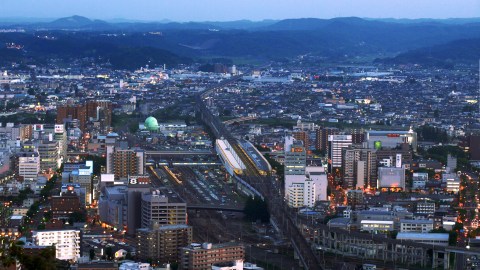Cancerphobia and Radiophobia Are Harming the Children of Fukushima

The thyroid gland is a little butterfly shaped thing inside that soft spot in your throat just above your chest bone. Doctors can feel it just by rubbing, which is how initial exams for possible thyroid cancer are usually done, sort of like digital prostate exams or self breast exams: feel around for bumps, and go from there.
But like breasts and prostates, thyroids can have bumps that are just bumps, nothing more: not cancer, and nothing that will harm you or kill you. Experts say that if you autopsy anybody’s thyroid, you can find cysts or nodules, or even cancerous cells themselves, that would never have caused harm or death. You and I probably have some of those bumps or cells in our thyroids right now.
But while those cells or cysts might not hurt us, the fear of radiation and the fear of cancer certainly could, as an unfolding tragedy for children living around in the prefecture of Fukushima in Japan illustrates.
Following the nuclear accident there, fear of radiation was off the charts, even after it was well established that the levels of radiation released by the accident weren’t. In most areas those levels were low, well below the levels that the Life Span Study of atomic bomb survivors has taught us are worth serious concern.
Nonetheless, radiophobia had the Fukushima region by the throat, so it was decided that all 360,000 or so children and teens would be offered screening for thyroid irregularities, since high enough doses of radiation, particularly the isotope Iodine 131, can increase the risk of thyroid cancer (the thyroid sucks up iodine like a sponge), and iodine 131 was released by the nuclear accident. And to be extra careful, the decision was made to screen the kids with ultrasound, not those normal clinical ‘feel for the bumps’ exams.
Unsurprisingly, given the prevalence of suspicious cysts or nodules in everyone’s thyroids, the screening turned up thousands of abnormalities. And unsurprisingly, the first assumption was that these were cancers caused by radiation from Fukushima, a fear aggressively promoted by anti-nuclear activists. Only, that’s not what the evidence says:
+ Testing in non-exposed kids in Japan found the same rate of abnormalities, and so did the testing of south Korean kids 15 years ago when the health care system switched from physical exam to ultrasound. Radiation couldn’t have cause those abnormalities.
+ The risk from the tiny dose of radiation received by most area residents was tiny.
+ Genetic tests of suspicious cells taken in biopsies from several thousand kids found that the genes matched the kind of thyroid abnormalities common in Japanes people as a whole, but did not match the abnormal thyroid cells taken from those exposed to radiation from Chernobyl.
“The evidence suggests that the great majority and perhaps all of the cases so far discovered are not due to radiation,” says Dillwyn Williams, a thyroid cancer specialist at University of Cambridge in the United Kingdom.
Still, tens of thousands of Japanese kids had biopsies, medical exams that can lead to infection or other complications. One of the outcomes of biopsies for cancer can be really serious: removal of the entire thyroid if cancerous cells are found, even though such cells are common in many thyroids and are unlikely to ever cause harm or death. In the end, more than 100 Fukushima-area kids have had their thyroids removed, with significant health implications for the rest of their lives.
Is something causing an abnormal spike in thyroid cancers in all the kids in Japan? (Remember, ultrasound screening found elevated rates of abnormalities in non-exposed non-Fukushima kids.) Or is this a case of overdiagnosis and overtreatment of a disease that scares us into doing things that are not medically called for? That’s what experts are calling what happened to the Fukushima kids. As Dennis Normile reported recently in Science magazine
Even though the vast majority of thyroid abnormalities are safe to ignore, “finding small lesions causes patients anxiety,” says Seiji Yasumura, vice director of the Fukushima Prefecture Health Management Survey. Virtually all of those diagnosed with thyroid cancer have had the glands removed, even though accumulating evidence suggests in many cases it might have been better to wait, the University of Tokyo’s Shibuya adds. “Careful observation would be the best option.”
And if you need evidence that excess screening to increase early detection of a scary disease doesn’t necessarily lead to any health benefit, consider what happened in South Korea, according to the article in Science. When the government made ultrasound testing available,
[T]hyroid cancer diagnoses exploded. In 2011, the rate of thyroid cancer diagnosis was 15 times what it was in 1993, yet there was no change in thyroid cancer mortality (my emphasis).
There are good physical and emotional reasons to fear nuclear radiation. At high enough doses it can cause more than 20 different kids of cancer. Emotionally, human-made risks scare us more than natural ones (radiation from the sun doesn’t scare us as much though it kills many more) and any risk we can’t detect with our senses leaves us feeling vulnerable and powerless and more afraid. There are certainly good physical and emotional reasons to fear cancer, a disease that often causes great suffering, and against which we feel have no control – many still think a cancer diagnosis is a death sentence – even though more and more forms of cancer are treatable, and even curable.
But when we let our emotions override an objective review of the evidence – which as this column notes we do all the time – it’s not radiation we should fear, or cancer. It’s our fears that we have to fear most. Those poor kids in Japan have offered us a profound lesson. We should listen.
(For a detailed summary of the thyroid issue around Fukushima, see this solid piece in The Hiroshima Syndrome, a blog that writes about the gap between the facts and our fears of nuclear radiation.)
—
image; GettyImages, Jeremy Sutton-Hibbert





